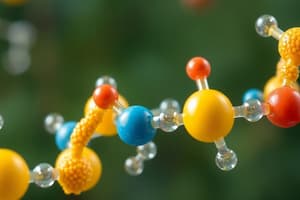Podcast
Questions and Answers
What role do carbohydrates primarily play in the human body?
What role do carbohydrates primarily play in the human body?
- Structural support
- Catalyzing chemical reactions
- Energy storage (correct)
- Immune response
How many common amino acids can occur in proteins?
How many common amino acids can occur in proteins?
- 17
- 27
- 22 (correct)
- 12
Which type of biological molecule serves as the basic building blocks of biological membranes?
Which type of biological molecule serves as the basic building blocks of biological membranes?
- Proteins
- Carbohydrates
- Nucleic acids
- Lipids (correct)
What test is commonly used to detect the presence of reducing sugars, such as glucose?
What test is commonly used to detect the presence of reducing sugars, such as glucose?
What is the main function of lipids in the body?
What is the main function of lipids in the body?
What type of bonds are present in oils?
What type of bonds are present in oils?
In biological membranes, the hydrophilic head of lipids is typically from one of three classes, except for:
In biological membranes, the hydrophilic head of lipids is typically from one of three classes, except for:
What does a blue-green color indicate in the Benedict's test?
What does a blue-green color indicate in the Benedict's test?
What does a purple color indicate in the Biuret test?
What does a purple color indicate in the Biuret test?
What is the term used to describe molecules with both hydrophilic and hydrophobic properties, like lipids?
What is the term used to describe molecules with both hydrophilic and hydrophobic properties, like lipids?
Study Notes
Biological Molecules and Nutrients: Exploring Carbohydrates, Proteins, Lipids, and Food Tests
Biological molecules are essential to life, and they form the building blocks of living organisms. Their diverse array includes carbohydrates, proteins, lipids, and nucleic acids. These macromolecules contribute to functions like energy storage, cell structure, and catalyzing chemical reactions. Nutrients, such as these molecules, are required by the body to sustain basic functions and are optimally obtained by eating a balanced diet.
Carbohydrates
Carbohydrates are the primary source of energy for humans and play essential roles in gut health and immune function. They consist of monosaccharides (e.g., glucose), disaccharides (e.g., sucrose), oligosaccharides, and polysaccharides (e.g., starch, cellulose). Carbohydrates should make up approximately 45 to 65% of energy intake based on minimum required glucose for brain function.
Proteins
Proteins are composed of amino acids and serve as structural and functional elements in the body. They are involved in processes like cell signaling, immune response, and the catalysis of chemical reactions as enzymes. There are 20 common amino acids that can occur in proteins, and the order of these amino acids determines the protein's structure and function.
Lipids
Lipids are the basic building blocks of biological membranes and serve as energy storage (e.g., triglycerides). They consist of a polar or hydrophilic head and one to three non-polar or hydrophobic fatty acid chains. Lipids are amphiphilic, meaning they have both hydrophilic and hydrophobic properties. Fatty acids consist of unbranched chains of carbon atoms connected by single bonds, and for lipids present in biological membranes, the hydrophilic head is typically from one of three classes: phosphatidic acid, glycerol, or cholesterol.
Food Tests: Benedict's and Biuret Tests
Benedict's Test
Benedict's test is used to detect the presence of reducing sugars in a solution, such as glucose or fructose. A blue-green color indicates a positive result, suggesting the presence of reducing sugars in a sample.
Biuret Test
The Biuret test is used to detect the presence of peptide bonds in proteins. A purple color indicates a positive result, indicating the presence of peptide bonds.
Understanding the roles of biological molecules, their structures, and how to test their presence allows us to appreciate their importance in sustaining life and maintaining good health. A balanced diet rich in carbohydrates, proteins, and lipids is essential for optimal nutrient intake.
Studying That Suits You
Use AI to generate personalized quizzes and flashcards to suit your learning preferences.
Description
Test your knowledge on the essential biological molecules including carbohydrates, proteins, and lipids, as well as the food tests like Benedict's and Biuret tests used to detect their presence. Understand their roles in energy storage, cell structure, and chemical reactions for sustaining life and good health.




